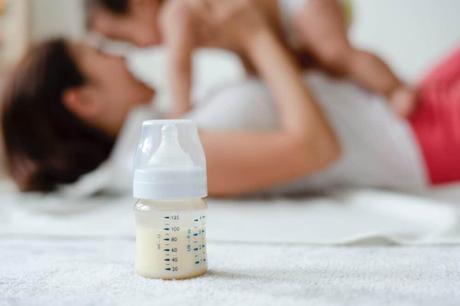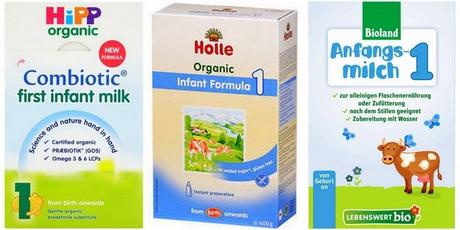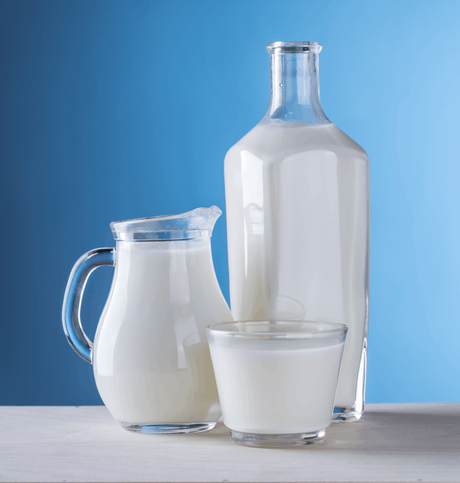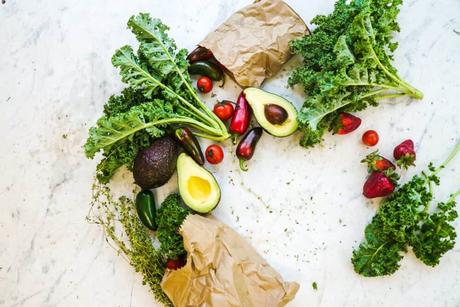This post may contain affiliate links. Please read my disclosure.
Getting proper hydration is incredibly important at every age, from infancy all the way to adulthood. For young babies, this is relatively simple: all of a baby's calories come from breast milk or formula, which also provide all of the necessary hydration. But as soon as your baby turns 1, it's time to gradually start introducing other beverages, and at the same time, help your child develop healthy habits that he or she will maintain for life.
So what are the healthiest drinks for your child? I've organized this post into the healthiest drinks by age group - so if your baby is older than 1, scroll down! Otherwise, start here 🙂
Age 0-1: Breastfeeding, Formula Feeding, or Both: It's All OK!

When it comes to "drinks" for infants, there are basically two options: breastfeeding or formula feeding. The situation may be relatively straightforward if you decide to breastfeed and it works well for both you and your baby, and if it fits in with your lifestyle and job obligations.
If you're nursing, breastmilk is all your baby needs. It contains all of the nutrients that your baby needs to grow and thrive, from lactose and fatty acids to proteins, vitamins, and minerals. There's no need to even think about introducing solid foods until your baby is at least four or five months old. Babies should still be getting most of their calories from breast milk and formula until their first birthday. Once you do introduce solids, you can introduce a sippy cup with water in it for mealtimes - just to help your baby get practice with holding a cup (vs. to make sure they're drinking a certain amount of water each day).
If you decide to formula feed, please don't feel guilty about it! Before I get to the best formulas, I want to share a few thoughts about breastfeeding. Breastfeeding can be wonderful, both as a special bonding experience, and for providing the optimal blend of nutrients for infant development. But breastfeeding isn't the best option for everyone, and there is absolutely nothing wrong with that. I have talked with so many moms who have tried their hardest to breastfeed, only to find that the experience is too painful to continue, or that their baby isn't gaining enough weight from breast milk alone. Or, despite countless visits with lactation consultants, babies still won't latch. There are so many reasons why breastfeeding sometimes just isn't possible or practical: some mothers may have a low milk supply, or they may develop mastitis, or they don't have anywhere to pump at work.
I hate the shaming associated with "breast is best," - which makes new moms feel like they have failed if they stop breastfeeding or if they are unable to breastfeed in the first place. "Breast is best" couldn't be farther from the truth. I believe that "FED is best". The most important thing is for you and your baby to be happy and healthy, and sometimes breastfeeding isn't the right fit.
As many of you know, I struggled with breastfeeding, both physically and emotionally, but I decided to keep nursing and pumping until Layla was around eight months old. However, as soon as I realized that supplementing with formula was going to be the right choice for us, I immersed myself in research about baby formula. Since then, I've spent years learning about the composition of different baby formulas, so I can distinguish between those made with inexpensive, highly-processed ingredients, and those that have been carefully designed to resemble breast milk as much as possible. So I have no hesitation in recommending formula feeding as an alternative or supplement to breastfeeding, because I have such confidence in the nutritional content of the highest-quality formulas. Formula-fed babies can grow up to be just as healthy as breastfed babies, and they can get all of the nutrition they need from formula.
As I've discussed in several other posts, the best baby formulas I've encountered, such as HiPP, Holle, and Lebenswert, all come from Europe. Not only are they made with organic, non-GMO ingredients, but they also follow the European Union's strict standards for pesticide-free, sustainable, biodynamic agriculture. Unlike many U.S. formulas that contain corn syrup solids, maltodextrin, or sucrose, these formulas are made with lactose, which is the main carbohydrate found in breast milk.

Formulas like HiPP Dutch, which is what I used with Layla, are designed to mimic the blend of fats in breast milk and the protein ratio of whey to casein. The ingredients list of vitamins, minerals, and prebiotics/probiotics makes organic European formula the closest approximation of breast milk you can find. Additionally, EU regulations prohibit the use of synthetic nutrients and synthetic preservatives, so you'll never find things like ascorbic palmitate, taurine, or l-carnitine in European formula. HiPP and Holle also make hypoallergenic formulas for babies with milk protein allergies, and formulas for babies with sensitive tummies or problems with constipation.
If you've decided to try European formula, it's really important to find a legitimate retailer that you can trust. Over the last five years, in addition to researching formula brands, I've become very familiar with the companies that source European baby formula for American parents. There are several retailers that I highly recommend due to their affordable prices, fast shipping policies, helpful customer service, and well-stocked inventory of quality products.
My top recommendations for where to buy European baby formula are:Age 1-2: The Healthiest Drinks for your child are Milk and Water Only!

If your child is between the ages of 1-2, I encourage you to stick with milk - breastmilk, toddler formula, or organic whole milk - and water only. At this age they really don't know the difference between juice or water (like if they're at a birthday party and the older kids are drinking juice, they won't really know if you give them water or milk!) So just avoid everything else for this year and stick to milk and water only - this will help your child's tastebuds to develop to enjoy these less sugary, more healthy drinks!
It's important to wait until age one before introducing cow's milk because it doesn't contain enough of the nutrients that growing babies (aged 0-12 months) need, and it could potentially lead to an iron deficiency. Until age 1, breastmilk and formula both provide complete nutrition for babies.
After the age of one, toddlers can drink up to three cups of whole cow's milk (or goat's milk) a day. I always recommend organic milk, so that you'll know it will be free from pesticides, hormones, antibiotics, and genetically-modified ingredients.
Milk provides so many crucial nutrients for growing kids, such as calcium, phosphorus, and magnesium, and it's especially important for bone health. Once you're ready to switch from formula or breastfeeding, I recommend starting with organic whole milk until age 2, and then moving to organic 2% milk for older kids. Don't use skim milk: kids need to have some fat content in their milk to help them absorb the other vitamins in the milk as they grow and develop!
Note: Some children may be dairy intolerant, and you should talk to your pediatrician if you see symptoms such as bloating, diarrhea, rashes, cramps, and gas. And for kids who regularly drink cow's milk or goat's milk, plant-based milks can be a fun way to mix up the beverage menu! There are some excellent non-dairy alternatives that don't have added sugar. For example, unsweetened coconut, almond, and rice milk are packed with nutrients and are great alternatives to cow's milk. They are usually fortified with additional nutrients like calcium, vitamin D, and vitamin B12. If you choose a non-dairy milk, make sure it is unsweetened, and doesn't have carrageenan added.
Age 2+: How to Raise a Water-Loving Kid Who Hates Soda
There's a lot of discussion about how to introduce your baby or toddler to healthy foods, but what about healthy drinks? There are so many temptations once kids turn 1 or 2 - juice boxes, punch, even soda come out of the woodwork! So how can you make sure that your child will grow up to love drinking water and milk, rather than sweet drinks like soda and juice?
The best advice I can give is to introduce your child to healthy drinks from an early age, and to make them the norm around your house - especially water!
Water isn't your only choice though, there are so many healthy drink options for children aged 2+:
- Water
- Unsweetened whole or 2% milk
- Unsweetened non-dairy milks (ie. almond, rice, coconut)
- No-sugar-added smoothies (made with fruit, veggies and water or milk)
- Unsweetened coconut water
- Herbal tea (decaf) - you can even turn this into iced tea by brewing it, cooling it, and pouring it over ice!
- Unsweetened Sparkling water
Water is the most important beverage on that list, and it should always be your go-to drink if your child says that he or she is thirsty.
But how much water should kids drink?
Water should make up the majority of your child's fluid intake. There are various recommendations about how much water kids should drink based on age, gender, size, and activity level. But, as a general rule, here's what I recommend:
- Toddlers should drink between two and four cups of water a day,
- Kids between the ages of four and eight should drink around five cups per day.
- Kids older than eight can aim for 5-8 cups of water per day.
Keep in mind, there's also plenty of water content in certain fruits and veggies - so that counts!

Not only do you need water to live - remember, your body is over 60% water - but it's also good for dental health, digestion, ensuring normal organ functions, maintaining body temperature, promoting healthy skin, assisting in brain development, etc. The list just goes on and on. Basically, just like plants, kids need plenty of water to grow!
Encouraging and reminding your kids to drink water (and the water complements listed above) is important, and having them see you choose water over other beverages will help instill healthy drinking habits. Offering your kids water when you're on the go and always providing it at mealtimes will help them get used to viewing water as their preferred beverage. You can further encourage this by letting them choose their favorite drinking cup. And to make water more interesting, turn it into a special treat by infusing it with fruits like strawberries and herbs like mint, making naturally-flavored water a fun and colorful alternative to juice.
Of course, there are plenty of other healthy options available to kids so I encourage you to switch it up for fun! I'm going to start with my recommendations for milk and go from there!
Milk: What's Healthy, What's Not
For kids aged 2+, I recommend Organic, 2% or 1% milk. If you choose to mix things up with a non-dairy milk - choose one that is unsweetened, preferably organic, and doesn't have carrageenan added. One note on milk: although unsweetened milk is an excellent drink for children, you will want to avoid flavored milks like chocolate or strawberry. These contain TONS of added sugar (sometimes as much as a Snickers bar!), often in the form of processed sweeteners like high fructose corn syrup. Milk tastes sweet enough on its own for kids to love the taste, without needing anything extra.
Smoothies: A fun way to get extra fruits and veggies!
While I don't recommend juice since that's just the sugar of the fruit without any of the other nutrients, smoothies can be great since they use up the whole fruit or veggie! In moderation, smoothies can be another good alternative to sweet drinks, especially if you make them at home so that they never have added sugar. The simplest homemade smoothies consist of pureed fruit, plain unsweetened yogurt, milk, and ice, but you can also add vegetables like kale and spinach, which is a great (and sneaky!) way to help your child get an extra serving of veggies. I love making smoothies and they are a fantastic snack for kids and adults alike!
Unsweetened Coconut Water (Avoid Gatorade!)
Although it's no substitute for plain water, unsweetened coconut water can be a decent alternative to sports drinks, juice, or soda. It contains electrolytes that are great for recovering after sports or exercise, and nutrients such as potassium, magnesium, and calcium.
Herbal, Decaf Tea (A Fun Surprise for Kids!)
Lastly, and this may surprise you, many kids actually enjoy drinking herbal tea! Served at room temperature (or as iced tea), herbal tea is a calorie-free, caffeine-free alternative to sugary drinks. Since herbal teas are naturally sweet, and come in all sorts of fruity flavors, you don't need to add any sugar to it. Just brew and serve!
Herbal teas have many purported health benefits, including anti-anxiety effects, soothing abdominal distress, and anti-inflammatory properties. Herbal teas like chamomile, rooibos, and mint are a great-tasting alternative to water. It's always a good idea to consult your pediatrician for advice before introducing herbal teas into your child's diet.
The Drinks Kids Should Always Avoid:
- Juice
- Sweetened, flavored milk (chocolate, strawberry)
- Soda
- Sports drinks
- Any other beverages that have sugar added to them (which you can see on the label!)
Even if you only drink water, milk, and unsweetened beverages at home, things can get more complicated when your child starts to attend birthday parties, daycare, and preschool. Suddenly, there are likely to be "bad drinks" around: not only juice, but also flavored milk, soda, and other sweetened beverages. The best thing you can do in these situations is to ask for water, to demonstrate to your child that water is still the best beverage option, regardless of where you are.
As your kids get older, once in a while juice is ok (think of it as a treat or a dessert, instead of a drink). Or fill their cup only 1/3 of the way with a more sugary drink, so they get to enjoy it but don't end up overdoing it. One trick I like is to mix 1-2 tbsp of fruit juice with 8-12oz water if your child really wants some fruit juice - it gives them the flavor of juice with way less sugar!
It's very common for children to have a sweet tooth, so encouraging them to drink water and milk is much better than simply giving them juice. At home, I always give my kids water or milk with their meals, although occasionally we have juice if it's a special occasion like a birthday or holiday. Although juice seems like it should be healthy (it's made with fruit, after all), it's just too sugary. Water and milk are always better options, and kids can get their fruit fix from whole fruit, which has fiber and other important nutrients. Because fruit juice is sweet and doesn't have fiber like whole fruit, it doesn't fill children up, so they are likely to want to constantly drink it.
I don't think it's effective to "ban" juice entirely, because this just isn't realistic. In my experience, showing your kids that juice is an occasional treat, but not banning it, means that they will be familiar with juice but not desperate to have it. As with most things, it's all about moderation! According to guidance from the American Academy of Pediatrics, juice intake should be limited to four ounces a day for children between the ages of one and three, and six ounces for children between the ages of four and six, but I know plenty of very happy kids that only have juice once a month or so. There's no reason to ever give juice as a regular/daily drink - once in a while is totally fine.
There's also no reason for children to drink soda. Soda is full of sugar, artificial colors, flavors and other preservatives. The sugar is as much or more than most candy bars, and having too much soda can lead to obesity, diabetes, liver disease, cardiovascular disease, and it is especially likely to cause tooth decay. For reference, a 12-ounce can of Coca-Cola contains nearly 10 teaspoons of sugar - thats two regular sized Snickers bars! It's also four teaspoons more than the American Heart Association's daily recommended sugar intake for children, regardless of whether they're toddlers or teenagers. Sports drinks can also contain significant amounts of sugar (as much as soda in most cases!), so avoid those too. Like I mentioned, unsweetened coconut water is a better choice for replenishing electrolytes after a particularly active soccer game or gymnastics class.
As your child gets older, I highly recommend having a conversation about why it isn't a good idea to drink a lot of juice or soda. Explaining why milk and water are so much healthier, and keeping your pantry stocked solely with healthy, low-sugar options, can go a long way towards getting kids to form positive habits and make healthy decisions for themselves.

